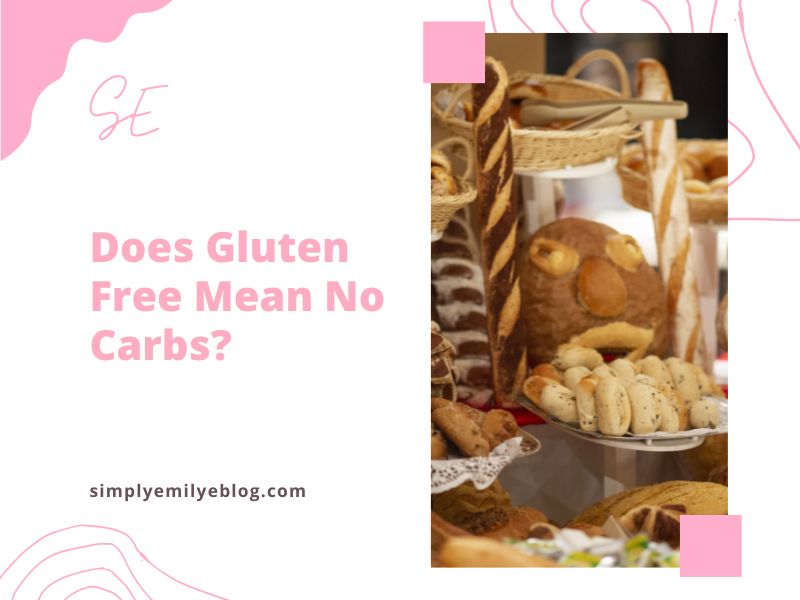That was one of the questions that I, as a food blogger, get asked all the time. Does gluten free mean NO carbs? Well this is a very important and informative topic, so let’s see what the answer is.
First of all, let’s start by defining what is gluten and what are carbohydrates. Gluten is a type of protein found in cereal grains like wheat, rye, and barley. It’s what gives bread, cakes, and other foods their structure and texture. Carbohydrates, on the other hand, are molecules made from single sugars and are an essential macronutrient for human survival.
- Does following a gluten-free diet mean eliminating all carbs?
- Can I still enjoy grains on a gluten-free diet?
- Are all gluten-free products low in carbs?
- Are there low-carb options within a gluten-free diet?
- Can I consume gluten-free grains on a low-carb diet?
- Is a gluten-free diet inherently healthier or lower in carbs?
- Can I lose weight on a gluten-free diet?
- Are there benefits to a gluten-free, low-carb lifestyle?
- Can I incorporate gluten-free and low-carb eating into a vegetarian or vegan lifestyle?
- Should I go gluten-free and low-carb without a medical reason?
- Can I still enjoy desserts on a gluten-free, low-carb diet?
- Are there specific fruits I should avoid on a gluten-free, low-carb diet?
- Can I dine out and maintain a gluten-free, low-carb lifestyle?
- How can I ensure I’m getting enough fiber on a gluten-free, low-carb diet?
- Are there any potential side effects of a gluten-free, low-carb diet?
- Can a gluten-free, low-carb diet be sustainable in the long term?
So, to answer the question: Does gluten free mean no carbs? The answer is No. Generally speaking, gluten-free foods still contain carbohydrates. Just like regular wheat-based foods, all gluten-free products still contain some amount of carbohydrates.
However, some gluten-free foods can be lower in carbohydrates and contain slightly different types of carbohydrates compared to conventional wheat-based foods, so these may provide different health benefits. For instance, certain gluten-free grains like amaranth and buckwheat are high in dietary fiber and protein.
I, like most food bloggers, will recommend looking into the nutritional facts labels when choosing gluten-free products to make sure you’re getting the best options. This is especially important for people following a carb-conscious diet. It’s also advisable to be mindful of certain additives and sugar replacements some products can have.
I’ve just finished writing an informative article on whether peach cobbler needs to be refrigerated. Feel free to read it whenever you’re available.
For those with gluten-sensitivity or Celiac Disease, going gluten-free can offer many health benefits, as cutting gluten out of your diet can reduce inflammation-causing diets. I know from personal experience, that I’ve suffered from bloating and digestive issues since I adopted a gluten-free diet about 4 years ago.
Moreover, if you are looking to reduce your carbohydrate intake without giving up delicious foods, then a gluten-free diet might be a good option. For example, instead of having a regular sandwich for lunch, try a wrap made from a gluten-free grain like quinoa or rice. This can help you to reduce your carb intake while still enjoying some delicious food.
Does following a gluten-free diet mean eliminating all carbs?
No, dear reader, a gluten-free diet does not equate to a carb-free existence. Gluten is a protein found in wheat, barley, and rye, not carbohydrates themselves. While some gluten-containing foods are high in carbs (such as bread and pasta), there are plenty of gluten-free carb options available, including rice, quinoa, potatoes, and corn.
Can I still enjoy grains on a gluten-free diet?
Absolutely! Grains are not off-limits when following a gluten-free lifestyle. There are a plethora of gluten-free grains to satisfy your carb cravings, including rice, corn, quinoa, millet, buckwheat, and sorghum. These grains can be incorporated into a balanced diet, providing necessary carbohydrates while keeping gluten at bay. Stop right there! If you have a liking for peanut butter and honey sandwiches, I’ve written an excellent article. Give it a read whenever you can.
Are all gluten-free products low in carbs?
Not necessarily. Gluten-free products come in various forms, and their carbohydrate content can vary. Some gluten-free alternatives, such as gluten-free bread and pasta, may have similar or even higher carbohydrate levels compared to their gluten-containing counterparts. It’s essential to read nutrition labels and choose gluten-free products based on your individual dietary needs.
Are there low-carb options within a gluten-free diet?
Indeed! If you’re following a gluten-free diet and aiming for lower carbohydrate intake, there are plenty of options available. Explore low-carb vegetables like leafy greens, broccoli, cauliflower, and zucchini. Additionally, healthy fats and proteins from sources like nuts, seeds, lean meats, fish, and eggs can be incorporated into your gluten-free meals.
Can I consume gluten-free grains on a low-carb diet?
While gluten-free grains contain carbohydrates, it’s possible to moderate your intake while still enjoying their benefits. Portion control and mindful choices are key. For a lower-carb approach, focus on incorporating moderate amounts of gluten-free grains like quinoa, buckwheat, or wild rice into your meals, while emphasizing non-starchy vegetables and lean proteins. After you’re wondering about the health benefits of Eggo waffles, I’ve actually written a great article. Whenever you have some free time, give it a read.
Is a gluten-free diet inherently healthier or lower in carbs?
Not necessarily. The healthfulness of a gluten-free diet depends on the overall food choices made within that framework. Gluten-free diets can be healthy and balanced when filled with whole foods like fruits, vegetables, lean proteins, and gluten-free grains. However, processed gluten-free products can be high in added sugars and unhealthy fats, which can contribute to higher carb content and overall less nutritious meals.
Can I lose weight on a gluten-free diet?
Weight loss is possible on a gluten-free diet, but it depends on various factors, including overall calorie intake and physical activity. Simply going gluten-free does not guarantee weight loss. If weight loss is your goal, it’s essential to focus on portion control, balanced meals, and regular exercise, rather than solely relying on the absence of gluten.
Are there benefits to a gluten-free, low-carb lifestyle?
For individuals with celiac disease or gluten intolerance, following a gluten-free lifestyle is essential for their health. Additionally, some people may find benefits in adopting a gluten-free, low-carb approach for specific health conditions or personal preferences. As with any dietary change, it’s advisable to consult with a healthcare professional or registered dietitian to ensure your nutritional needs are met.
Can I incorporate gluten-free and low-carb eating into a vegetarian or vegan lifestyle?
Certainly! Following a gluten-free and low-carb diet is possible within a vegetarian or vegan lifestyle. It may require a bit more planning and creativity, but there are plenty of plant-based protein sources available, such as tofu, tempeh, legumes, and quinoa. Additionally, incorporating gluten-free grains like buckwheat, wild rice, or amaranth can provide variety and balance to your meals.
Should I go gluten-free and low-carb without a medical reason?
The decision to go gluten-free and low-carb should be based on individual circumstances and health needs. If you do not have celiac disease, gluten intolerance, or a specific medical reason to eliminate gluten or reduce carbs, it’s generally not necessary to adopt such a restrictive approach. It’s important to focus on a balanced and varied diet that suits your body’s unique requirements.
Can I still enjoy desserts on a gluten-free, low-carb diet?
Absolutely! There are plenty of delicious dessert options that cater to a gluten-free, low-carb lifestyle. Explore recipes using alternative flours like almond flour or coconut flour, natural sweeteners such as stevia or monk fruit, and healthy fats like avocado or coconut oil to create mouthwatering treats without compromising your dietary goals.
Are there specific fruits I should avoid on a gluten-free, low-carb diet?
While most fruits are generally considered gluten-free, some fruits are higher in natural sugars and carbohydrates. It’s advisable to consume fruits in moderation, especially those with higher sugar content, such as bananas, grapes, and mangoes. Opt for lower-sugar fruits like berries, melons, and citrus fruits to keep your carb intake in check. If you’re interested in finding out how long cooked tilapia stays fresh in the fridge, I recently wrote an excellent article. Take a look when you get a chance.
Can I dine out and maintain a gluten-free, low-carb lifestyle?
Dining out while following a gluten-free, low-carb diet can be challenging but not impossible. Look for restaurants that offer gluten-free options and choose dishes that focus on lean proteins, non-starchy vegetables, and gluten-free grains in moderate portions. Communicate your dietary needs to the waitstaff and ask questions about ingredients and preparation methods to ensure your meal aligns with your goals.
How can I ensure I’m getting enough fiber on a gluten-free, low-carb diet?
Fiber is an important component of a healthy diet and can be obtained even when following a gluten-free, low-carb lifestyle. Focus on incorporating non-starchy vegetables, nuts, seeds, and low-carb fruits like berries into your meals. Additionally, include gluten-free whole grains like quinoa and buckwheat, which provide both fiber and essential nutrients.
Are there any potential side effects of a gluten-free, low-carb diet?
As with any dietary change, there can be potential side effects when adopting a gluten-free, low-carb diet. Some individuals may experience initial symptoms like fatigue, constipation, or changes in digestion as their bodies adjust. It’s important to listen to your body, stay hydrated, and ensure you’re consuming a balanced array of nutrients to minimize any potential side effects.
Can a gluten-free, low-carb diet be sustainable in the long term?
Sustainability is key when considering any dietary approach. A gluten-free, low-carb diet can be sustainable in the long term if approached with mindfulness and flexibility. It’s crucial to focus on a variety of nutrient-dense foods, adapt recipes and meal plans to suit your preferences, and seek guidance from a healthcare professional or registered dietitian to ensure you’re meeting your nutritional needs over time.




